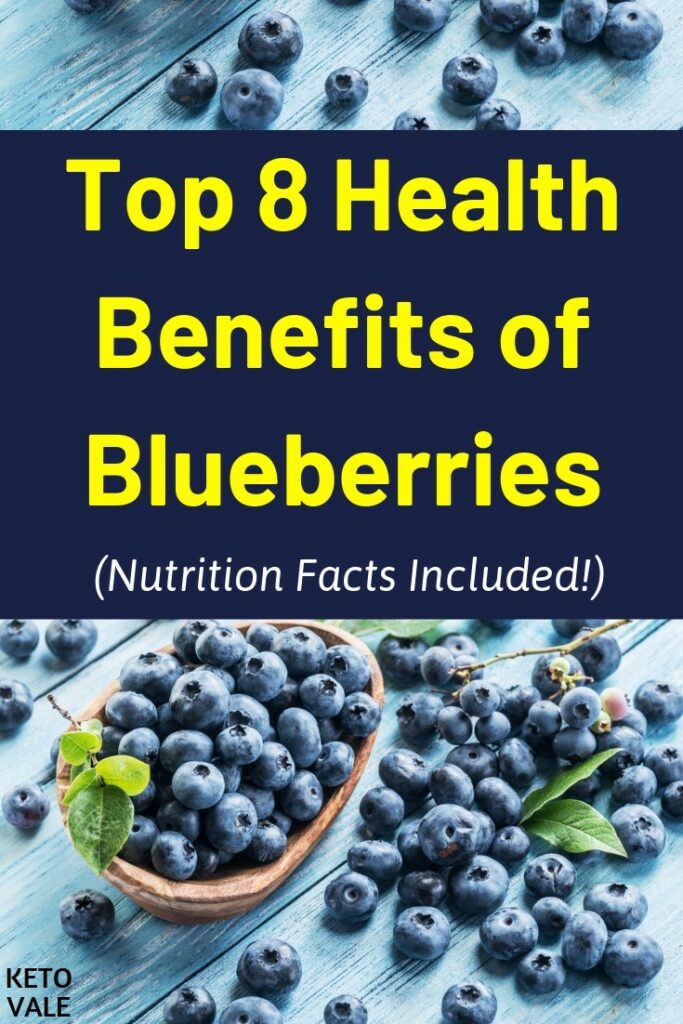Not many fruits are allowed on the ketogenic diet because of their high sugar and carbohydrate content. But some fruits are OK to eat in moderation.
Berries are lower in net carbs than many fruits. They are also one of the healthiest foods on the planet because of their protective antioxidant properties, which makes them a good exception to the no-fruit-allowed rule.
Research shows that blueberries can fight chronic diseases, reduce blood sugar levels, and help you lose weight. They also have amazing benefits on your brain health.
Nutritional Value of Blueberry
Here is the nutritional information in a 100-gram serving of blueberries (1):
- 57 calories
- 0.3 grams of fat
- 14.5 grams of carbs (12.1 grams of net carbs)
- 2.4 grams of fiber
- 0.7 grams of protein
Vitamins:
- Vitamin A: 54.0 IU (1% daily recommended value)
- Vitamin C: 9.7 mg (16% daily recommended value)
- Vitamin E: 0.6 mg (3% daily recommended value)
- Vitamin K: 19.3 mcg (24% daily recommended value)
- Niacin: 0.4 mg (2% daily recommended value)
- Vitamin B6: 0.1 mg (3% daily recommended value)
- Folate: 6.0 mcg (1% daily recommended value)
- Pantothenic Acid: 0.1 mg (1% daily recommended value)
- Choline: 6.0 mg
Minerals:
- Calcium: 6.0 mg (1% daily recommended value)
- Iron: 0.3 mg (2% daily recommended value)
- Magnesium: 6.0 mg (1% daily recommended value)
- Phosphorus: 12.0 mg (1% daily recommended value)
- Potassium: 77.0 mg (2% daily recommended value)
- Sodium: 1.0 mg
- Zinc: 0.2 mg (1% daily recommended value)
- Copper: 0.1 mg (3% daily recommended value)
- Manganese: 0.3 mg (17% daily recommended value)
- Selenium: 0.1 mcg
What Are Blueberries Good For?
Blueberries are one of the most well-researched foods on the planet and have long been praised for their anti-inflammatory and antioxidant properties, which contribute to a wide variety of health benefits.
You should be eating blueberries regardless of your diet. Here are the top benefits of blueberries as supported by science.
#1. They boost your memory and reduce symptoms of depression
Research shows that blueberries boost your brain health in several ways.
One study found that blueberries contain polyphenolic compounds such as anthocyanins that have anti-inflammatory and antioxidant effects on the body. These anthocyanins have been shown to increase neuronal signaling in the brain to improve memory function and prevent neurodegeneration (2).
The study took nine older adults with memory problems and gave them wild blueberry juice every day for 12 weeks. Results showed that the subjects who received the blueberry juice had reduced depressive symptoms and lower glucose levels. They also did better on memory performance tests than subjects who did not receive blueberries daily.
We should note that eating whole blueberries is better than drinking blueberry juice because you get the added benefit of more fiber.
Juices also tend to contain added sugars, which would contribute to the carb content and make them off-limits on a keto diet.
Raw blueberries tend to contain more nutrients than juice because they have not been pasteurized or heated to high temperatures, which may kill off heat-sensitive antioxidants.
#2. They reduce your risk of heart attack
Research shows that women who eat blueberries have a reduced risk of having a heart attack.
One study found that women who ate the most blueberries were 34% less likely to suffer from a heart attack when compared to women who barely ate any blueberries (3).
So how many blueberries do you have to eat to protect your heart?
According to the authors of the above-mentioned study, there was hardly any difference between women who only ate a few blueberries and women who ate no blueberries at all. It appears you have to eat a serving of a half of cup of blueberries three times a week to reap the heart benefits (4).
#3. They boost your mood
Ever notice that you’re in a better mood after eating blueberries? It’s no accident. Research shows that blueberries boost your mood.
According to one study, blueberries contain flavonoid antioxidants that boost your mood and decrease the risk of developing depression (5).
The study indicated that flavonoids improve your executive function. Impaired executive function is linked to the development of cognitive processes that affect your mood and cause depression.
Authors of the study found that flavonoids improve executive function to boost mood and decrease symptoms of depression.
Remember that to reap the full effects of the flavonoids in blueberries, you should eat them raw. This is because heating them to high temperatures or drinking blueberry juice will kill off heat-sensitive flavonoids.
#4. They may protect you against cancer and heart disease
Blueberries have been shown to protect you against dangerous chronic illnesses, such as cancer and heart disease.
According to one study, blueberries contain phenolic compounds that have anti-cancer agents when taken both in the form of whole foods and in nutrition supplements. The study concluded that blueberries protect you against cancer by inhibiting the production of pro-inflammatory molecules, oxidative stress, and DNA damage (6).
Blueberries also increase apoptosis, which occurs when “bad” cells kill themselves before they can damage your health. One study even found that blueberries help premalignant cells regress (7).
Blueberries also protect your heart when eaten as part of a heart-healthy diet, such as the ketogenic diet.
One study found that eating berries including blueberries that contain anthocyanin extracts significantly improve LDL oxidation, total plasma antioxidant capacity, dyslipidemia, glucose metabolism, and lipid peroxidation. All of these factors play a role in developing heart disease (8).
#5. They improve blood glucose levels
Research shows that blueberries have glucose regulating effects to help improve blood sugar levels even if you do not have diabetes.
According to one study, people who supplemented their diet with whole blueberries reduced their glucose concentrations. Results showed that the subjects who drank a blueberry smoothie twice a day for 6 weeks improved their insulin sensitivity. These results were consistent among both diabetic and non-diabetic subjects (9).
Another study confirmed these findings by showing that blueberries regulate glucose uptake in cells. Results found that blueberries contain insulin-like properties that prevent glucose toxicity in the blood (10).
In other words, blueberries help regulate sugar in the blood to prevent spikes associated with high blood sugar levels. Authors concluded that blueberries have anti-diabetic properties that can be used in combination with a healthy diet to control blood sugar.
#6. They reduce age-induced cognitive decline
Blueberries have proven to be very beneficial for brain health. In addition to boosting your mood and reducing the symptoms of depression, blueberries have also been found to reduce age-related cognitive decline (11).
According to one study, aging naturally contributes to memory problems and brain plasticity impairment. Blueberries have been shown to contain polyphenols such as resveratrol, flavonoids, and anthocyanins that help boost cognitive processes and favorably modulate brain activity.
The study found that mice who were fed a blueberry-rich diet for 14 weeks improved their learning and memory scores. Their brain polyphenol content was evaluated and results showed that they had more polyphenols in the part of their brain associated with memory and learning after eating the blueberry-rich diet (12).
Additionally, older mice who ate the blueberries displayed a better survival rate. These results showed that flavonoid-rich blueberries may prevent age-induced cognitive decline, which can help improve your quality of life in your later years.
#7. They possess pharmaceutical grade anti-inflammatory properties
Research shows that blueberries are every bit as good as pharmaceutical drugs when it comes to reducing inflammation. The best part is they don’t come with unwanted side effects.
One study found that blueberry leaves reduced inflammatory markers in people with type 2 diabetes, which is a condition that is linked to chronic inflammation. Subjects with type 2 diabetes were given a blueberry supplement three times a day approximately 15 to 30 minutes before a meal along with 100 mL of water for four weeks (13).
Results showed that subjects who took the blueberry supplement improved their fasting plasma glucose and significantly reduced their inflammatory markers. Authors of the study indicated that in addition to having anti-diabetic effects, blueberry also contains pharmaceutical-grade anti-inflammatory properties.
This can help you the next time you suffer from an inflammatory injury such as a backache. It can also help with the maintenance of chronic inflammatory disorders such as Crohn’s disease, ulcerative colitis, and arthritis.
#8. They may help you lose stomach fat
Blueberries have been shown to help you lose that pesky stomach fat that is so hard to get rid of.
Results of one study found that mice who were fed a blueberry-rich powder for 90 days had less abdominal fat, lowered their cholesterol and triglycerides, and improved their insulin sensitivity and fasting glucose (14).
These results suggest that adding blueberries to your diet can help you maintain a healthy body weight.
Blueberries on the Ketogenic Diet
Many ketogenic dieters shy away from fruit on the ketogenic diet because they tend to be high in carbs and sugar.
With a daily limit of 20-25g net carb allowed on keto, you can easily get kicked out of ketosis if you overindulge in fruits, especially the high-sugar-content ones because they are also delicious.
As you can see from the nutritional information, a 100-gram serving of blueberries provides you with about half of your intake of carbs for the day if you’re on the keto diet. However, blueberries are so nutrient dense that they are worth every carb!
Berries provide so many health benefits that they are worth adding to your keto food list. You might have to be extra careful about portion sizes, but blueberries can be incorporated into your keto diet with a bit of planning.
Like most low carb fruits especially berries, they still contain a fair amount of sugar and carbohydrates, but that shouldn’t deter you from eating them in small amounts.
Blueberries have numerous health benefits and are often considered one of the healthiest foods on the planet due to their high antioxidant content.
Eating raw blueberries is always best because it means that you will consume the most amount of antioxidants available.
Research shows that frozen and cooked blueberries often contain reduced amounts of these important compounds (15).
The longer you cook your blueberries, the more antioxidant nutrients you will lose. Because of this, we recommend eating fresh blueberries whenever possible.
Enjoy no more than a handful of fresh blueberries each day along with a few ounces of hard cheese or your favorite low carb nuts. You can also add blueberries to salads or smoothies.
Here are a few recipes to get you started:
- Keto Collagen Protein Blueberry Pancakes
- Keto Blueberry Collagen Smoothie
- Healthy Keto Almond Blueberry Muffins
- Blueberry Vanilla Mousse Cake
Conclusion
When it comes to eating fruit on the ketogenic diet plan, you need to be careful with the serving size. Blueberries are so good for you that they are worth the carbohydrates that they contain.
Research shows that blueberries contain high amounts of antioxidants with anti-inflammatory properties that can help you fight disease and improve brain health well into your later years. Blueberries have also been shown to help reduce stomach fat and boost your mood to reduce depressive symptoms.
A 100-gram serving of blueberries contains around 12 grams of net carbs. For this reason, you may want to limit your intake to a handful of day. Eat your blueberries fresh because frozen and cooked blueberries often contain fewer antioxidants.
We also recommend enjoying your blueberries along with a handful of your favorite nuts or hard cheeses with healthy fats to enhance the absorption of these beneficial antioxidant properties. You can also add blueberries to your favorite kind of genetic recipes, such as muffin, pancakes, or smoothies.
Enjoy this post? Share to save for later!

Photo credit: Valentyn_Volkov/Depositphotos.com







